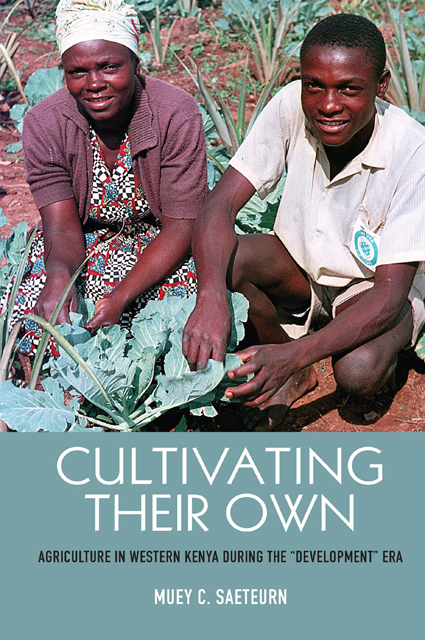Book contents
- Frontmatter
- Dedication
- Contents
- Acknowledgments
- Acronyms and Abbreviations
- Maps
- Introduction
- 1 The Role of Agriculture in Kenya’s Political Economy in the Era of Transition and Independence
- 2 Western Kenya’s Region, People, and the Origins of Population Density
- 3 Chavakali Secondary School: A Place of Learning and Farming
- 4 “Doing Their Part”: 4-K Farmers’ Clubs
- 5 Friends and Acres: The Friends Africa Mission Stewardship Program
- 6 “Home is Home”: The Lugari Settlement Scheme and Maragoliland
- Conclusion: Agricultural Production—The New (Old) Sexy
- Appendix: Interviewee Information
- Notes
- Bibliography
- Index
1 - The Role of Agriculture in Kenya’s Political Economy in the Era of Transition and Independence
Published online by Cambridge University Press: 18 January 2023
- Frontmatter
- Dedication
- Contents
- Acknowledgments
- Acronyms and Abbreviations
- Maps
- Introduction
- 1 The Role of Agriculture in Kenya’s Political Economy in the Era of Transition and Independence
- 2 Western Kenya’s Region, People, and the Origins of Population Density
- 3 Chavakali Secondary School: A Place of Learning and Farming
- 4 “Doing Their Part”: 4-K Farmers’ Clubs
- 5 Friends and Acres: The Friends Africa Mission Stewardship Program
- 6 “Home is Home”: The Lugari Settlement Scheme and Maragoliland
- Conclusion: Agricultural Production—The New (Old) Sexy
- Appendix: Interviewee Information
- Notes
- Bibliography
- Index
Summary
Mzee kasema turudi mashambani,
Hakuna vya bure,
Rais kasema turudi mashambani tuijenge Kenya,
Mzee kasema, turudi mashambani,
Hakuna vya bure…
The old man said let us go back to the countryside
There is nothing for free
The president said let us go back to the countryside to build (develop) Kenya
The old man said let us go back to the countryside
There is nothing for free
The catchy government-sponsored tune, Turudi Mashambani, played on radio stations all across Kenya during the early independence years. The song’s chorus, as the epigraph illustrates, reiterated Kenyatta’s 1964 “Back to Land” speech in which he appealed to the wanainch (citizens), especially able-bodied idle Kenyans, to consider the career possibilities tied to the agricultural sector. The chorus’s lyrics, in particular, sought to mitigate the high hopes that desperate urban and rural Kenyans had placed in their newly elected African leaders. The peoples’s expectations included having access to more white collar job opportunities and, for some Kenyans, the provision by the government of free arable plots of land in desirable locations. While ordinary Kenyans assumed that these types of demands were reasonable and well within their rights as wanainch, such expectations interfered with the nascent Kenyatta administration’s own nation-building plans. Consequently, the Turudi Mashambani song was a lighthearted reminder to the public that the uhuru (independence) government was intent on pursuing a development program grounded on agriculture, regardless of whether the people themselves had the passion or resources to engage fully in the process. The Kenyatta government’s agricultural development agenda therefore was not only disconnected from the realities and expectations of ordinary Kenyans, especially those in Maragoliland, but also made some Kenyans question whether any real change had occurred as a result of independence.
As scholars of East Africa have recognized, African farmers living in colonial Kenya were the main targets of agrarian policies that stressed soil conservation practices and population control measures. Having outsiders, whether foreign missionaries or Kenyan agricultural officers, hold village barazas (meetings) to demonstrate the latest agricultural practices and to encourage local farmers to meet commercial harvest quotas was indeed a common occurrence experienced by rural men and women in colonial and post-colonial western Kenya where there was a shortage of arable land.
- Type
- Chapter
- Information
- Cultivating their OwnAgriculture in Western Kenya during the 'Development' Era, pp. 26 - 40Publisher: Boydell & BrewerPrint publication year: 2020



